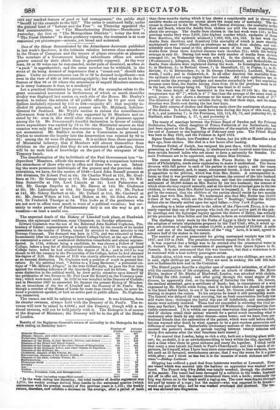One of the things demonstrated by the Attendance-Accounts published in
last week's Spectator, is the intimate relation between close attendance in the House of Commons and the tenure of places revocable at pleasure. The members of a Government holding subordinate offices are under greater control by their chiefs than is generally supposed. At the very least, 38 or 39 votes can be commanded, under pain of dismissal, as often as "a push" ie apprehended; and the same number can be withheld, in the event of its being deemed of importance that a " count-out " should take place. Under no circumstances can 38 or 39 be deemed insignificant-not even in the view of 400 or 500 attending nightly; but what must be the in- fluence of that 38 or 39 where the attendance of unpaid Members amounts, as in many instances it does, to a mockery?
Let a practical illustration be given, and let the examples relate to the great economical movement in furtherance of which so much shamlike rivalry was displayed last session on each side of the House. Mr. Henley's motion to reduce the salaries of all public officers by 10 per cent was (tellers included) rejected by 151 to 104-majority 47: that majority in- cluded 38 placemen, and all were present save Mr. Maitland, Solicitor- General for Scotland. Mr. Wyld's motion to reduce the miscellaneous allowances from 6,4231. to 4,7281. was supported by 35 Members and re- sisted by 54: even in this small affair the names of 28 placemen appear among the 54. Mr. Drummond's fanciful declaration in favour of cutting down expenditure was carried by 73 to 70: the Ministerial muster on that occasion was only 26, and hence the contre-temps. Take another instance not csonomicaL Mr. Baillie's motion for a Commission to proceed to Ceylon to continue the inquiry into the insurrection was rejected by 92 to 35: among the 92 were 33 placemen. It is evident from these specimens of- Ministerial industry, that if Members will absent themselves from divisions on the ground that they do not understand the questions, there will be no such lack of knowledge on the part of the occupants of the Treasury bench.
The transformation of the individuals of the Peel Government into " in- dependent " Members, affords the means of drawing a comparison between the attendance of those who are in office and those who are not. Select- ing the more prominent individuals of the present and the previous Admi- nistrations, we have for the session of 1849-Lord John Russell present at
136 divisions, Sir have, Peel at 64; Sir Charles Wood at 151, Mr. Goul- burn at 79; Sir George Grey at 179, Sir James Graham at 95; Sir Wil- liam Somerville at 199, Lord Lincoln at 52; Lord Palmerston at 102, Mr. George Smythe at 16; Mr. Hawes at 140, Mr. Gladstone at 60; Mr. Labonchere at 134, Sir George Clerk at 68; Mr. Parker at 141, Mr. Sidney Herbert at 66; Mr. Tufnell at 155, Mr. Cardwell at 44; Mr. James Wilson at 145, Lord Mahon at 36; Sir John Jervis at 160, Sir Frederick Thesiger at 34. This looks as if the gentlemen who are not now in office were much in want of a political vocation; but cer- tainly to make pastime of Parliamentary duty is not the way to get a
vocation-at least a useful one •
























 Previous page
Previous page